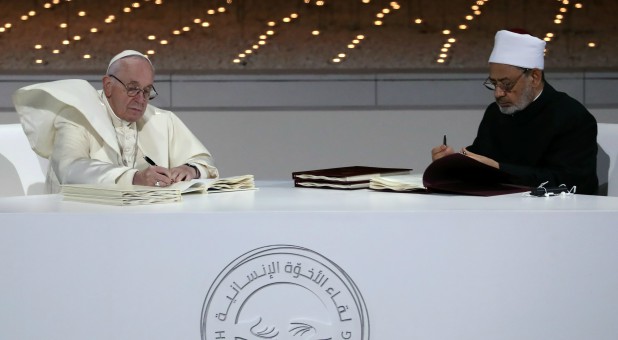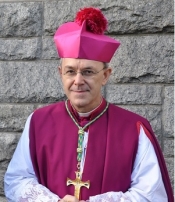From The Remnant
Written by Bishop Athanasius Schneider
In the past decades one often heard - even from the mouth of some representatives of the Church’s hierarchy - statements about the theory of “anonymous Christians.” This theory says the following: The mission of the Church in the world would consist ultimately in raising the awareness that all men must have of their salvation in Christ and consequently of their filial adoption in Christ. Since, according to the same theory, every human being possesses already the sonship of God in the depth of his personality. Yet, such a theory contradicts directly Divine Revelation, as Christ taught it and His Apostles and the Church over two thousand years always transmitted it unchangingly and without a shadow of a doubt.

Pope Francis and Grand Imam of al-Azhar Sheikh Ahmed al-Tayeb sign a document on God-willed "diversity of religions", during an inter-religious meeting. (REUTERS/Tony Gentile)
In his essay “The Church, consisting of Jews and Gentiles” (Die Kirche aus Juden und Heiden) Erik Peterson, the well-known convert and exegete, long since (in 1933) warned against the danger of such a theory, when he affirmed that one cannot reduce being a Christian (“Christsein”) to the natural order, in which the fruits of the redemption achieved by Jesus Christ would be generally imputed to every human being as a kind of heritage, solely because he would share human nature with the incarnated Word. However, filial adoption in Christ is not an automatic result, guaranteed through belonging to the human race.Since the beginnings of the Church there was the assertion, as testified by Tertullian: “One is not born as a Christian, but one becomes a Christian” (Apol., 18, 5). And Saint Cyprian of Carthage formulated aptly this truth, saying: «He cannot have God for his Father, who has not the Church for his mother” (De unit., 6).
Christianity is the only God-willed religion. Therefore, it can never be placed complementarily side by side with other religions. Those would violate the truth of Divine Revelation, as it is unmistakably affirmed in the First Commandment of the Decalogue, who would assert that the diversity of religions is the will of God. According to the will of Christ, faith in Him and in His Divine teaching must replace other religions, however not by force, but by loving persuasion, as expressed in the hymn of Lauds of the Feast of Christ the King: “Non Ille regna cladibus, non vi metuque subdidit: alto levatus stipite, amore traxit omnia” (“Not with sword, force and fear He subjects peoples, but lifted up on the Cross He lovingly draws all things to Himself”).
There is only one way to God, and this is Jesus Christ, for He Himself said: “I am the Way” (John 14: 6). There is only one truth, and this is Jesus Christ, for He Himself said: “I am the Truth” (John 14: 6). There is only one true supernatural life of the soul, and this is Jesus Christ, for He Himself said: “I am the Life” (John 14: 6).
Does Francis Believe Homosexual ACTS Are Immoral?Click the Pic for "An Open Letter to Pope Francis"
God gave the Apostles and through them the Church for all times the solemn order to instruct all nations and the followers of all religions in the only one true Faith, teaching them to observe all His Divine commandments and baptize them (cf. Mt. 28: 19-20). Since the preaching of the Apostles and of the first Pope, the Apostle Saint Peter, the Church proclaimed always that there is salvation in no other name, i.e., in no other faith under heaven by which men must be saved, but in the Name and in the Faith in Jesus Christ (cf. Acts 4: 12).
With the words of Saint Augustine the Church taught in all times: “The Christian religion is the only religion which possesses the universal way for the salvation of the soul; for except by this way, none can be saved. This is a kind of royal way, which alone leads to a kingdom which does not totter like all temporal dignities, but stands firm on eternal foundations.” (De civitate Dei, 10, 32, 1).
In recent times the Magisterium presented substantially the same unchanging teaching in the Document “Dominus Jesus” (August 6, 2000), from which we quote the following relevant assertions:
“Theological faith (the acceptance of the truth revealed by the One and Triune God) is often identified with belief in other religions, which is religious experience still in search of the absolute truth and still lacking assent to God who reveals himself. This is one of the reasons why the differences between Christianity and the other religions tend to be reduced at times to the point of disappearance.” (n. 7) “Those solutions that propose a salvific action of God beyond the unique mediation of Christ would be contrary to Christian and Catholic faith.” (n. 14) “Not infrequently it is proposed that theology should avoid the use of terms like “unicity”, “universality”, and “absoluteness”, which give the impression of excessive emphasis on the significance and value of the salvific event of Jesus Christ in relation to other religions. In reality, however, such language is simply being faithful to revelation” (n. 15) “It is clear that it would be contrary to the faith to consider the Church as one way of salvation alongside those constituted by the other religions, seen as complementary to the Church or substantially equivalent to her, even if these are said to be converging with the Church toward the eschatological kingdom of God.” (n. 21) “The faith rules it out, in a radical way, that mentality of indifferentism “characterized by a religious relativism which leads to the belief that ‘one religion is as good as another' (John Paul II, Encyclical Letter Redemptoris missio, 36).” (n. 22)
The Apostles and the countless Christian martyrs of all times, especially those of the first three centuries, would have been spared martyrdom, if they had said: “The pagan religion and its worship is a way, which as well corresponds to the will of God.” There would have been for instance no Christian France, no “Eldest Daughter of the Church,” if Saint Remigius had said to Clovis, the King of the Francs: “Do not despise your pagan religion you have worshiped up to now, and worship now Christ, Whom you have persecuted up to now.” The saintly bishop actually spoke differently, although in a rather rough way: “Worship what you burned, and burn what you have worshiped!”
True universal brotherhood can be only in Christ, and namely between baptized persons. The full glory of God’s sons will be attained only in the beatific vision of God in heaven, as Holy Scripture teaches: “See what kind of love the Father has given to us, that we should be called children of God; and so we are. The reason why the world does not know us is that it did not know him. Beloved, we are God's children now, and what we will be has not yet appeared; but we know that when he appears we shall be like him, because we shall see him as he is.” (1 John 3: 1-2).
No authority on earth – not even the supreme authority of the Church – has the right to dispense people from other religions from the explicit Faith in Jesus Christ as the Incarnated Son of God and the only Savior of mankind with the assurance that the different religions as such are willed by God Himself. Indelible – because written with the finger of God and crystal-clear in their meaning – remain, however, the words of the Son of God: “Whoever believes in the Son of God is not condemned, but whoever does not believe is condemned already, because he has not believed in the name of the only Son of God” (John 3: 18). This truth was valid up to now in all Christian generations and will remain valid until the end of time, irrespective of the fact that some people in the Church of our so fickle, cowardly, sensationalist, and conformist time reinterpret this truth in a sense contrary to its evident wording, selling thereby this reinterpretation as continuity in the development of doctrine.
Outside the Christian Faith no other religion can be a true and God-willed way, since this is the explicit will of God, that all people believe in His Son: “This is the will of my Father, that everyone who looks on the Son and believes in him should have eternal life” (John 6: 40). Outside the Christian Faith no other religion is able to transmit true supernatural life: “This is eternal life, that they know you the only true God, and Jesus Christ whom you have sent” (John 17: 3).
February 8, 2019
+ Athanasius Schneider,
Auxiliary Bishop of the Archdiocese of Saint Mary in Astana


No comments:
Post a Comment
Comments are subject to deletion if they are not germane. I have no problem with a bit of colourful language, but blasphemy or depraved profanity will not be allowed. Attacks on the Catholic Faith will not be tolerated. Comments will be deleted that are republican (Yanks! Note the lower case 'r'!), attacks on the legitimacy of Pope Leo XIV as the Vicar of Christ, the legitimacy of the House of Windsor or of the claims of the Elder Line of the House of France, or attacks on the legitimacy of any of the currently ruling Houses of Europe.